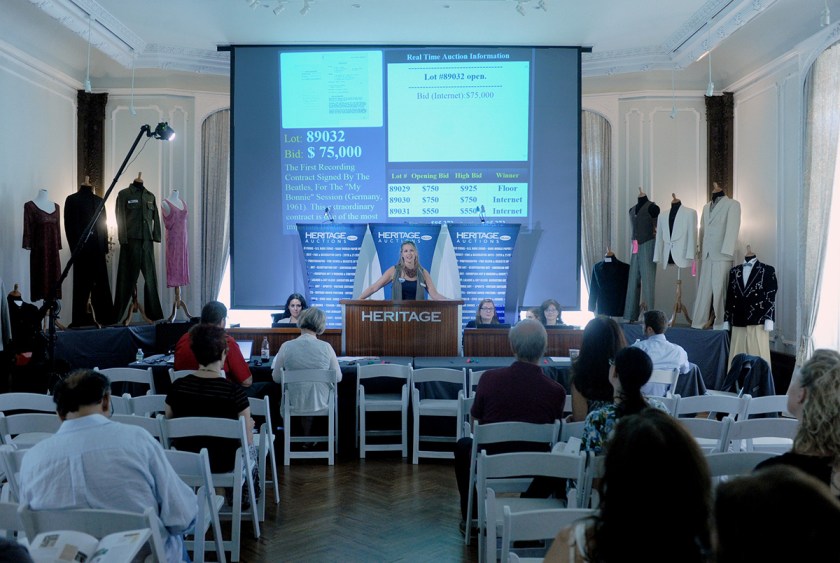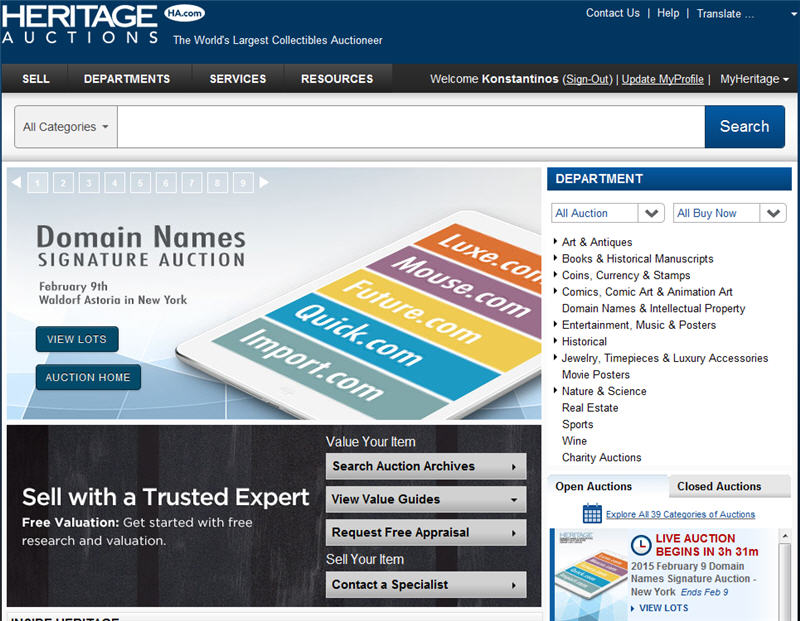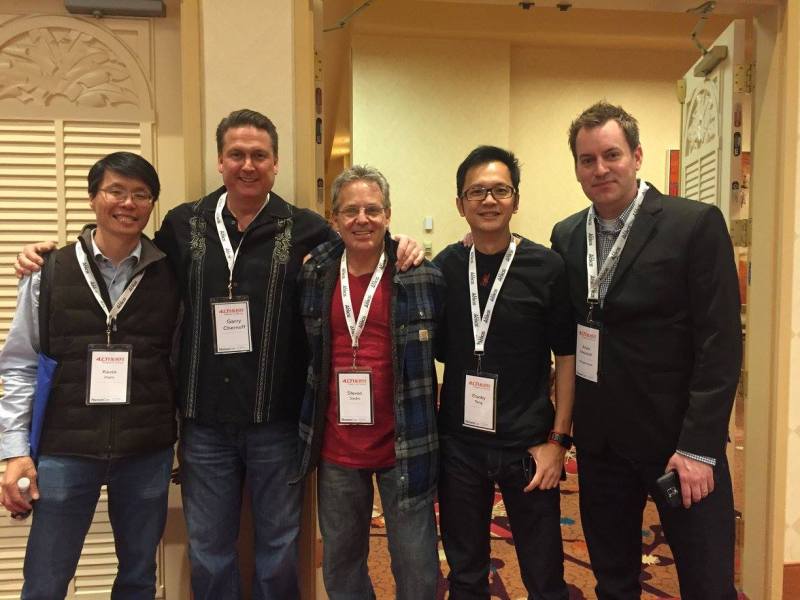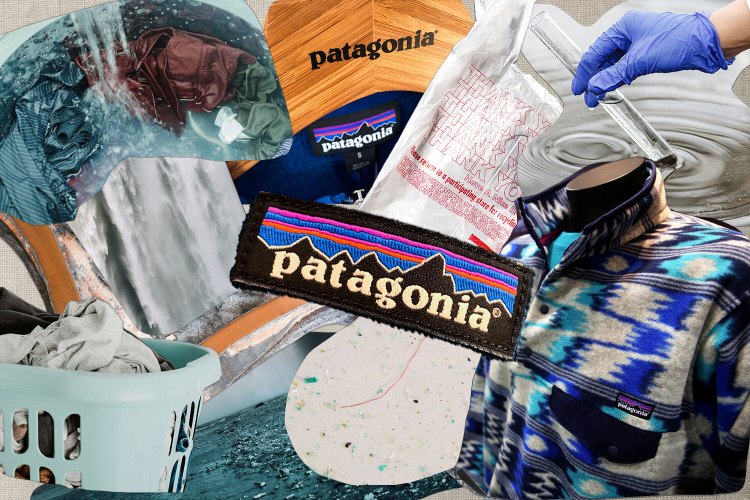
Picture an auction setting like the one pictured above: Men in suits and ties and women in dresses sit quietly in pew-like rows, thumbing through catalogs, bid paddles at the ready, waiting for the auctioneer to offer up the next lot. Maybe it’s a priceless Picasso, a dog-eared comic book, or a Babe Ruth jersey.
Now, imagine that the lot everybody’s bidding on isn’t actually there. No one can see it, hold it, touch it, or review its condition. It didn’t get flown in from Switzerland the week before, or require a single line of copy in the catalog.
That’s exactly what happens at every auction Aron Meystedt has ever run.
The 37-year-old is the founder and director of Dallas, Texas–based Heritage Auctions’ Domains and Intellectual Property department, which sells web domain names and other intangible digital assets. The business of selling web domains has been around for over 20 years, but it’s an emerging marketplace in the eyes of the auction world.
Heritage is the first mainstream auction house to sell web domains and other digital assets at auction. And Meystedt is the wizard behind the curtain, who in just three years, has made $10 million worth of digital deals for his employer.

Meystedt’s no novice at the domain-name game; he’s been at it since the late ’90s—when he was still just in high school. “I had always run little internet businesses out of my parents house. We acted like we had a shipping department, but it was just my bedroom,” he explains. Meystedt continued living at home through college, selling an array of items—shoes, watches, stereo equipment—via the internet. But once he discovered domains, his “shipping department” got a lot cleaner, and he started making serious money.
In the early years, domain “parking” was a common way of earning easy returns online, and Meystedt took advantage of the trend. Back then, users were like conquistadors in the Amazon, typing URLs into web browsers, stumbling upon new territories, and clicking on those fancy, flashing ad units. And every time someone did, boom!, Meystedt would make some money.
He also bought up domain names that already had an audience attached to them like copier.com and iBlog.com, and attempted to build them out. And the entire time, he was filling out a Rolodex of contacts within the domain name–owning community. He soon realized that there was a budding aftermarket for domains; and a group of investors, businesses, and collectors who were actively buying, selling, and trading domains like baseball cards.
Meystedt finally hit cruise control in the early 2000s, when he discovered the goldmine that was short domain names: two-, three-, or four-letter addresses (and the future bread-and-butter of his job at Heritage). Ironically, his big break came shortly after taking a part-time job at his parents’ trucking company. “They wanted me to be stop playing on the internet and do something real with my life,” says Meystedt. Then he bought a domain in the stock photo space for $10,000 and “flipped it” for $225,000 to a contact in Canada.
That was the end of Meystedt’s trucking career.
These days, aside from his gig at Heritage, Meystedt still owns XF Investments—and the two-letter xf.com domain, of course—which is billed as a “private investment firm specializing in digital investments, real estate, and early stage venture capital funding.” (Within the last year, he was offered $1.5 million for the domain name alone and turned it down.) He also has about a dozen high-end domains in his growing personal collection.

In his day job for Heritage, Meystedt averages only about one auction per year. If that seems extremely low, there’s a reason for that. Since the domain business has been bumping privately since the ’90s, it’s pretty difficult to find sellers willing to use a middle-man like Heritage to close a deal. In fact, Meystedt explains that most of the business during the single auction happens lightning fast (i.e. it’s not all that exciting), and a lot of the business occurs privately, outside of the normal live auction setting.
Heritage’s cut is also quite a bit smaller than its average physical-item auctions, too. “My fees are lower, because we don’t have to do photography, handle shipping, print catalogs or mail them, authenticate [items], [or] do storage,” he explains. So that could make for a potentially more lucrative opportunity for a seller, who generally pays between 10-15 percent in fees. However, the real legwork comes in working those contacts in the domain-owning world and targeting them with marketing/PR campaigns.
For those trying to place a value on a www, a dot, a few more letters, another dot, and a com, Meystedt likens it all to the real estate business. “There’s only so many good pieces of land that you can build your dream on, whether it’s a business or a house, and a domain name’s kind of the foundation,” he says.
So, for example, a fellow who was looking to launch his own classic car company bought Classic.com from a Heritage auction. According to the domain specialist, what’s hot right now is names that have dual-use; not only do they describe a business, but also could be used for a future pivot.
Other high-end domains that have exchanged hands at Heritage during Meystedt’s tenure include Digital.com, Quick.com, NL.com, and VE.com.
It’s actually those two- and three-letter dot-com names that are the most sought after in today’s marketplace. A few years ago “they were all hovering around $100,000 each,” explains Meystedt.
That is, until the Chinese took notice. Since then, Chinese investors have been pouring into the space and pushing the value of two- and three-letter domain names into the near-seven-figure range. (To that point, Meystedt recently unloaded VE.com for nearly $1 million.)
Unlike tying one’s disposable income up in supercars and priceless paintings, a domain name requires zero space and maintenance. It can be moved seamlessly between countries, and its owners will never have to get it tuned up or pay for storage. Plus, it can’t be stolen. Meystedt likens them to Bitcoin.
But the most important source of strength for the market is that all the best-known two-letter combinations are owned by big-time brand names like Morgan Stanley (ms.com), American Airlines (aa.com), Barnes & Noble (bn.com), notes Meystedt. The reason? Well, for one, a short domain name takes less time to type into a web browser or better yet, mobile device (i.e. they make for better and faster business). Not to mention it makes company email addresses way less unruly.
And it’s also cool. “It’s a bit of a prestige thing having a two-letter [name],” says Meystedt.

One of the dozen domains that Meystedt currently owns (since 2009) he considers his personal “Holy Grail.” The prize? Symbolics.com.
Computer geeks may recognize Symbolics.com as the first and oldest domain name, registered 30 years ago today on March 15, 1985, long before the internet even was the internet. (Back then, it was known as the Advanced Research Projects Agency Network, or Arpanet.) Symbolics was a Cambridge, Massachusetts–based computer company that was a product of MIT’s Artificial Intelligence lab, and pretty much helped invent the internet. In a sense, it’s the Declaration of Independence of domain names.
For Meystedt and many others (he’s gotten numerous offers all of which he’s turned down), it’s a symbol of where all of this began. In a way, it’s the greatest business card money can buy. And it’s never going anywhere.
Learn more about Aron Meystedt’s department at Heritage Auctions below.
—Will Levith for RealClearLife
This article was featured in the InsideHook newsletter. Sign up now.























